A Study of Von Hugel
ThE steady growth of Baron von Hfigel's influence—especially outside the Roman communion—together with the difficulty and individuality of his literary style,,made it inevitable that sooner or later some analysis of ,hisidoctrine and guide to his works should be attempted. This was the more -to be desired because there is no part of the Baron's writings in which an orderly account of his philosophic outlook can be found. That dislike of mere " braininess," that distrust of abstract speculation, which was one of his most marked characteristics —arising as it did from a humble and ever-deepening realization of the greatness and mystery of life—all this inclined him to an avoidance of hard outlines and neat classifications. Hence those who try for the first time to explore his writings are often merely bewildered by the richness of that which is put before them. The trees are magnificent, the greatness of the world in which they stand is constantly suggested to its ; yet the forest is hard to realize as a whole. For the Baron wrote out of the heart of a living and burning experience ; he was concerned to press home those massive realities and certitudes which had become the governing facts of his own existence, not to map out their-Mutual relationships or make of them a water-tight metaphysical scheme. He distruSted mere logic, a superficial consistency. For him, " depth mattered most " ; it was a childish folly which supposed that human creatures could ever bring Reality into focus and " get everything quite clear."
The interpreter of such a mind as this has no easy task before him. Me is dealing with one who is by turns philo- sopher, mystic and prophet ; and in whom the proceedings and findings of the intellect, though of utmost importance, must always be subordinate to the certitudes of the soul. So the analytic method, however skilfully and sympathetically employed, will neyer disclose to us the secret of Von Hflgel's greatness. This can only be learnt by those who surrender themselves to his influence, put aside all idea of searching for a " system," and accept bit by bit and as they are able to assimilate it the spiritual food -he has to give. Thus we must not expect to obtain through Dr. Dakin's interesting and painstaking work any cleir -vision of the Supernatural as the Baron understood it. We shall learn what it is not ; but hardly what it is. Its unique and living splendour eludes the most skilful commentator, as the life of a bird eludes the taxidermist. Nevertheless such a book as this can and will fulfil a most useful function ; for, by bringing together and expounding some of Von lifters chief philo- sophic ideas, it builds a bridge over which the ordinary educated reader can approach him. Largely by means of numerous quotations from his writings, collected and arranged with extraordinary skill—so that some of his pages have almost the appearance of a mosaic—Dr. Dakin gives a detailed picture, or rather perhaps a diagram, of the Baron's teaching on God and man, the nature of knowledge, and religious experience.
In philosophy Von Hfigel was, by declaration, a Critical Realist. He believed, as against all subjective idealism, that man was in genuine contact with a many-levelled world of genuine realities, ring by stages to the Reality of all realities—God. Convinced that religion as he understood it had no more subtle enemy than monism, he placed these realities in two great classes, Natural and Supernatural ; distinct, yet interpenetrative. The supernatural life " is as real a fact as the natural life " : and the great gifts of this spiritual genius were largely devoted to the bringing home of that truth in all its implications to the minds of modern men. It is only within this general framework that his religious philoiophy and hiS view of religious experi- ence can be understood. We are grateful, therefore, to Dr. Dakin for the amazing skill and patience with which he has sorted out and made accessible the many scattered passages which, when brought together, make the Baron's metaphysical position comparatively clear. He is perhaps less successful when he ventures into the deep waters of mystical experience ; for here he is inclined to rely too much on the psychologists, and too little on the saints.
ITY.LYN , UNDERHILL. .






















































 Previous page
Previous page